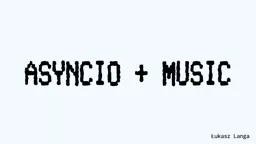PPT-Asyncio + music Łukasz
Author : jezebelfox | Published Date : 2020-10-06
Langa Łukasz Langa ambv on GitHub fbme ambv llanga lukaszlangapl todays plan Discover how AsyncIO can be used to process MIDI to drive hardware synthesizers
Presentation Embed Code
Download Presentation
Download Presentation The PPT/PDF document "Asyncio + music Łukasz" is the property of its rightful owner. Permission is granted to download and print the materials on this website for personal, non-commercial use only, and to display it on your personal computer provided you do not modify the materials and that you retain all copyright notices contained in the materials. By downloading content from our website, you accept the terms of this agreement.
Asyncio + music Łukasz: Transcript
Download Rules Of Document
"Asyncio + music Łukasz"The content belongs to its owner. You may download and print it for personal use, without modification, and keep all copyright notices. By downloading, you agree to these terms.
Related Documents














